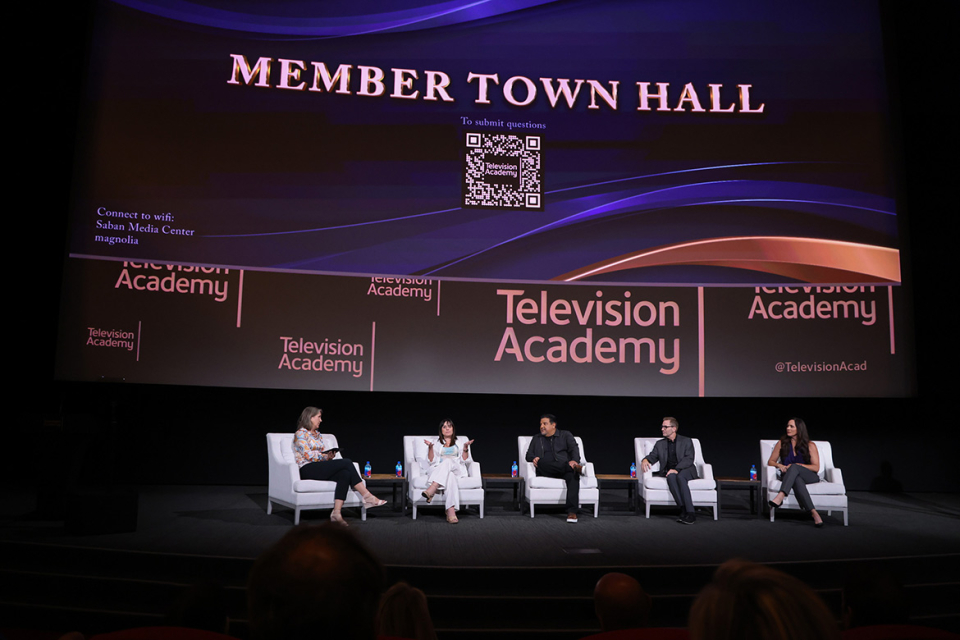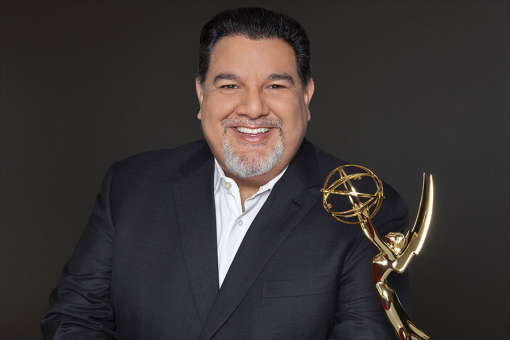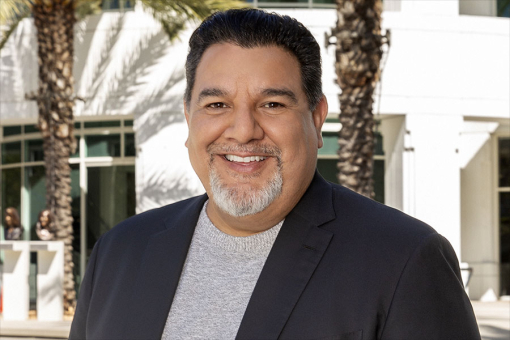Information and engagement for Television Academy members were on the agenda when the Academy presented the first Member Town Hall held in several decades. Academy leaders and several hundred members gathered July at the Saban Media Center in the NoHo Arts District, for the event, which was also livestreamed.
Watch the replay of this event.
"This is your Academy," chair Cris Abrego told the audience. "It's not mine. It's not the staff's. It is yours and ours together. And for this organization to be strong, to drive impact, to elevate storytelling, it needs — no, in fact, it demands — your engagement and participation. This is why we put together this evening, to create a forum for conversation and mutual engagement."
Academy president and CEO Maury McIntyre provided an overview: There are currently 25,186 members, including 2,705 associate members and 122 faculty and 127 student members across 31 peer groups, with about 1,200 people belonging to more than one peer group. People of color make up about one-third of the membership.
Linda Swain, vice president of membership and outreach, spoke on video about a new program, Your Voice Matters, "a virtual suggestion box" where at the beginning of the year, "members can provide feedback across five key areas: membership, awards, peer group events, governor elections and volunteering. Every piece of that feedback was shared with the peer group governors and their executive committees." While that initiative is to help governors develop their yearly agendas and deal with concerns across all peer groups, members can provide feedback at any time via the Academy website.
One result of Your Voice Matters input: more For Your Consideration and other events for New York members. Another, shared by Television Executives peer group co-governor and membership committee chair Jo DiSante, is that members want to make new connections and feel supported in a peer-to-peer environment. Hence, Peer Group Circles, which after a successful pilot program have been expanded this year.
The circles, DiSante explained, “bring together small intimate groups of members, generally within a peer group, on a monthly basis. These meetings foster deep connections and provide opportunities for networking and support.”
There are also members who want to connect beyond peer groups, according to Academy vice chair Sharon Lieblein, CSA, to be addressed by the launch of Affinity Groups in early 2025; affinities might include new mothers in the industry or retirees and will be created with members’ input. "We want to uplift the voices of each community within the Academy and the TV industry," she said.
Wendy Aylsworth, co-governor of the Science & Technology peer group and co-leader of the Academy's AI Task Force, reported on resources available to members concerned about how artificial intelligence will affect their livelihoods, and on possible future AI-related activities; Abrego noted that the Academy has become involved in public policy and member advocacy on AI and other matters.
Heather Cochran, Academy CFO and COO, moderated a Q&A panel spotlighting members' previously submitted questions, selected to reflect common concerns. Academy Foundation executive director Anne Vasquez, who had earlier outlined the Foundation's education and preservation programs, answered a query about members getting involved by suggesting judging, hosting interns, speaking on panels and/or donating funds.
"We can’t do our work without your help," Vasquez said. "My hope, my expectation, is that we'll be growing all these programs, and that we can make it easier for people from all geographies and walks of life to be able to be part of this industry that we all love."
In response to another question, Abrego expressed optimism that the industry would bounce back from its current tough time of contraction. "The work of this membership changes policy, changes culture, globally," he said. "What we do is always going to be needed."











